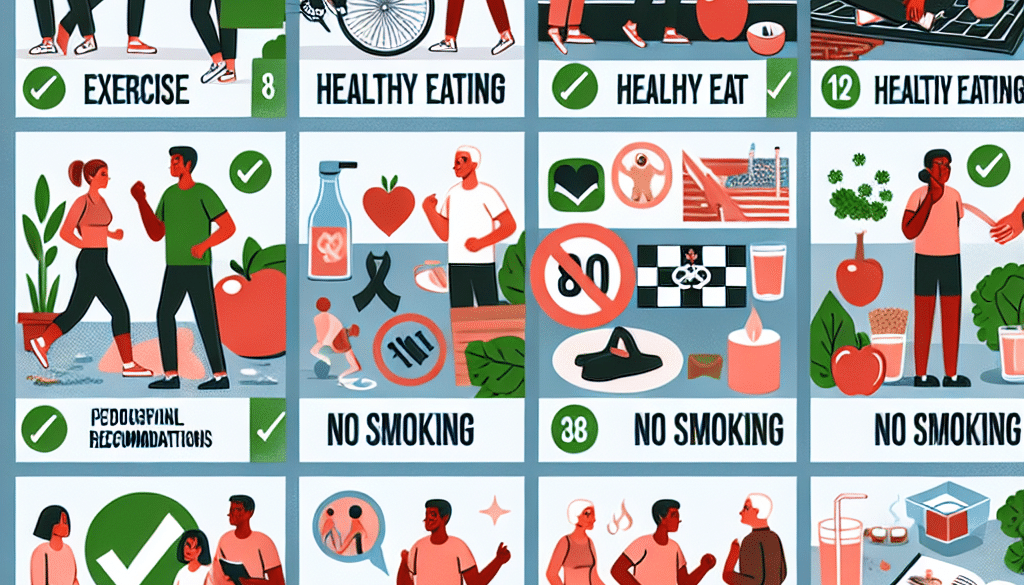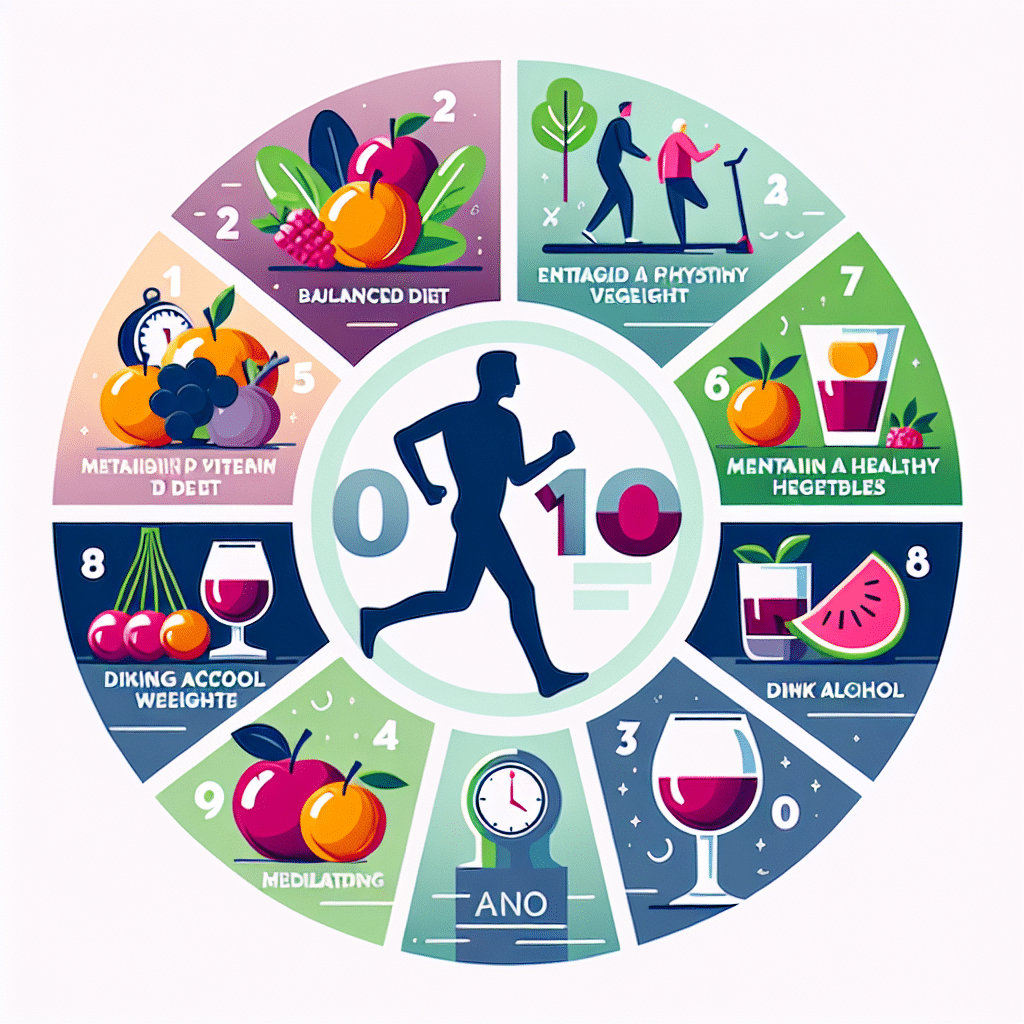WCRF Provides Ten Lifestyle Recommendations to Reduce Cancer Risk
-
Table of Contents
- Reduce Cancer Risk with WCRF’s Ten Lifestyle Recommendations
- Understanding the WCRF’s Recommendations
- Delving into the Ten Lifestyle Recommendations
- 1. Maintaining a Healthy Weight
- 2. Engaging in Regular Physical Activity
- 3. Consuming a Plant-Based Diet
- 4. Limiting Fast Foods and Processed Foods
- 5. Reducing Red and Processed Meat Intake
- 6. Avoiding Sugar-Sweetened Drinks
- 7. Limiting Alcohol Consumption
- 8. Not Relying on Supplements for Cancer Prevention
- 9. Encouraging Breastfeeding
- 10. Following Recommendations After Cancer Diagnosis
- Supporting Evidence and Case Studies
- Conclusion: Integrating Lifestyle Changes for Cancer Prevention
- ETChem’s Protein Products: A Healthy Addition to Your Diet
Reduce Cancer Risk with WCRF’s Ten Lifestyle Recommendations
Cancer remains one of the leading causes of death worldwide, but research shows that lifestyle choices can significantly impact one’s risk of developing the disease. The World Cancer Research Fund (WCRF) has developed a set of guidelines aimed at reducing the global cancer burden through prevention strategies. These recommendations are based on extensive research and provide actionable steps that individuals can take to lower their risk of cancer. In this article, we will explore the WCRF’s ten lifestyle recommendations and discuss how adhering to these guidelines can lead to a healthier, cancer-resistant lifestyle.
Understanding the WCRF’s Recommendations
The WCRF is a leading authority on cancer prevention research related to diet, weight, and physical activity. Their recommendations are the result of a continuous update project (CUP) that reviews global research on how diet, nutrition, physical activity, and weight affect cancer risk and survival. Here are the ten lifestyle recommendations provided by the WCRF:
- Be a healthy weight
- Be physically active
- Eat a diet rich in whole grains, vegetables, fruit, and beans
- Limit consumption of “fast foods” and other processed foods high in fat, starches, or sugars
- Limit consumption of red and processed meat
- Limit consumption of sugar-sweetened drinks
- Limit alcohol consumption
- Do not use supplements for cancer prevention
- For mothers, breastfeed your baby if you can
- After a cancer diagnosis, follow the WCRF recommendations, if you can
Delving into the Ten Lifestyle Recommendations
1. Maintaining a Healthy Weight
Excess body fat is linked to an increased risk of several cancers, including breast, colorectal, and kidney cancers. The WCRF advises maintaining a healthy Body Mass Index (BMI) within the range of 18.5 to 24.9 to reduce cancer risk.
2. Engaging in Regular Physical Activity
Physical activity helps to regulate hormone levels, reduce inflammation, and maintain a healthy weight. The WCRF recommends at least 150 minutes of moderate-intensity or 75 minutes of vigorous-intensity physical activity per week.
3. Consuming a Plant-Based Diet
A diet rich in whole grains, vegetables, fruit, and beans can protect against various cancers. These foods are high in fiber, vitamins, minerals, and phytochemicals that have anti-cancer properties.
4. Limiting Fast Foods and Processed Foods
High-calorie fast foods and processed foods contribute to weight gain and obesity. The WCRF suggests limiting these foods to prevent cancers associated with excess body fat.
5. Reducing Red and Processed Meat Intake
Red and processed meats have been linked to an increased risk of colorectal cancer. The WCRF advises consuming no more than about three portions per week, which equates to 350–500g (about 12–18oz) cooked weight.
6. Avoiding Sugar-Sweetened Drinks
Sugar-sweetened beverages contribute to weight gain and obesity. The WCRF recommends choosing water or unsweetened drinks instead.
7. Limiting Alcohol Consumption
Alcohol is a known carcinogen and is associated with an increased risk of several cancers. The WCRF suggests that for cancer prevention, it’s best not to drink alcohol.
8. Not Relying on Supplements for Cancer Prevention
The WCRF advises obtaining nutrients directly from foods rather than supplements, as there is little evidence that supplements protect against cancer.
9. Encouraging Breastfeeding
Breastfeeding has benefits for both the mother and the child, including a reduced risk of certain cancers for mothers and a healthier start in life for children.
10. Following Recommendations After Cancer Diagnosis
Adhering to the WCRF’s recommendations is also beneficial for cancer survivors, as it can help improve survival and reduce the risk of recurrence.
Supporting Evidence and Case Studies
Multiple studies have supported the WCRF’s recommendations. For instance, a study published in the American Journal of Clinical Nutrition found that adherence to WCRF/American Institute for Cancer Research guidelines was associated with a lower risk of cancer, cancer mortality, and all-cause mortality among older adults.
Another case study involves the Mediterranean diet, which aligns closely with the WCRF’s recommendations. Research has shown that populations following this diet have a lower incidence of cancer compared to those who consume a more Westernized diet.
Conclusion: Integrating Lifestyle Changes for Cancer Prevention
Adopting the WCRF’s ten lifestyle recommendations can significantly reduce one’s risk of developing cancer. These guidelines are not only backed by scientific evidence but are also practical and achievable for most people. By maintaining a healthy weight, staying active, eating a balanced diet, limiting harmful substances, and following other preventive measures, individuals can take proactive steps towards cancer prevention and overall health improvement.
ETChem’s Protein Products: A Healthy Addition to Your Diet
Incorporating high-quality protein into your diet is an essential part of maintaining a healthy lifestyle. ETChem’s protein products, including their range of collagen supplements, can be a valuable addition to your diet. Collagen is known for its health benefits, including supporting skin health, joint health, and overall wellness.
ETChem’s collagen products are sourced from high-quality materials and are designed to be easily incorporated into your daily routine. Whether you’re looking to enhance your diet with marine, fish, bovine, or chicken collagen, ETChem offers a variety of options to suit your needs.
By choosing ETChem’s protein products, you’re not only supporting your own health but also aligning with the WCRF’s recommendations for a diet rich in nutritious foods. To learn more about ETChem’s offerings and how they can contribute to a cancer-preventive lifestyle, please contact them at karen(at)et-chem.com.
About ETChem:
ETChem, a reputable Chinese Collagen factory manufacturer and supplier, is renowned for producing, stocking, exporting, and delivering the highest quality collagens. They include marine collagen, fish collagen, bovine collagen, chicken collagen, type I collagen, type II collagen and type III collagen etc. Their offerings, characterized by a neutral taste, instant solubility attributes, cater to a diverse range of industries. They serve nutraceutical, pharmaceutical, cosmeceutical, veterinary, as well as food and beverage finished product distributors, traders, and manufacturers across Europe, USA, Canada, Australia, Thailand, Japan, Korea, Brazil, and Chile, among others.
ETChem specialization includes exporting and delivering tailor-made collagen powder and finished collagen nutritional supplements. Their extensive product range covers sectors like Food and Beverage, Sports Nutrition, Weight Management, Dietary Supplements, Health and Wellness Products, ensuring comprehensive solutions to meet all your protein needs.
As a trusted company by leading global food and beverage brands and Fortune 500 companies, ETChem reinforces China’s reputation in the global arena. For more information or to sample their products, please contact them and email karen(at)et-chem.com today.





